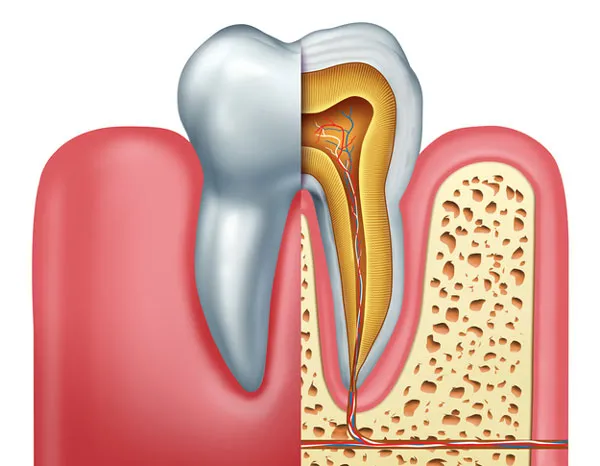Root Canal

Fort Worth, TX
Deep down inside the solid structures of our teeth lies a layer of soft tissue, which is known as the pulp. This pulp contains nerves, blood vessels, and connective tissue, which extends from our dental crowns, all the way to the end of the roots. Due to advanced decay or cavities, oral disease, or injuries, it can get considerably inflamed or infected. This can result in a severe toothache, which could lead to bigger problems if left untreated. Although teeth in such poor condition were typically removed and replaced with restorations in the past, fortunately advances in technology made it possible for us here at HomeTown Dental, Fort Worth (Sycamore) to save your natural teeth. This is by performing an endodontic treatment, often referred to as root canals.
What Is A Root Canal?
A root canal intends to remove the problematic pulp from your tooth to alleviate the pain and prevent the development of further complications. The pulp is responsible for the growth of our teeth, but it serves little to no purpose when they are fully matured. Usually, extreme toothache and sensitivity to hot and cold stimulus, along with irritated gum tissue surrounding the tooth in some cases, are signs of a damaged pulp. However, it can be easily confused with the pain produced by gum disease, inappropriate stress in a tooth, and similar conditions.
An evaluative consultation with our team will be necessary prior to the treatment. This is in order to determine whether it will be beneficial for you or not. Certain patients may not be candidates for a root canal. Nevertheless, this procedure is slowly being possible for a wider variety of patients, even for those with teeth with more advanced damage in them.
How Is A Root Canal Performed?
After numbing the area with local anesthesia and isolating the tooth from saliva with a dental dam, we will begin by creating an opening in your tooth to reveal the pulp layer. Then we will put fluids in the canals to clean them and kill bacteria. This makes it so we can subsequently and carefully remove the infected pulp with an endodontic file. If the tooth is in a complicated condition by the time of the procedure, we may place a temporary filling in the opening so it can heal, and you will come again in the following weeks for a follow-up appointment with us.
Whether the procedure continues during the first appointment or in a second visit, the next part involves the filling of your canals with a permanent, rubber-like material called gutta- percha. The opening, even sealed, could make your teeth prone to fracturing, so a replacement crown is almost always suggested afterwards.
Is The Recovery Painful?
Since we are alleviating an existing pain, most patients do not feel any discomfort post-op. However, you may experience a minimal soreness or swelling in the gum tissue holding the teeth, which can be helped with over-the-counter medications and should disappear in the following days. It is recommended to avoid chewing on the side where the operation took place. A tooth with an endodontic treatment can still get cavities, so good oral hygiene will be key for it to last a lifetime. To learn more about root canals, please contact HomeTown Dental, Fort Worth (Sycamore) at (817) 224-2251 to request an appointment with us today.
